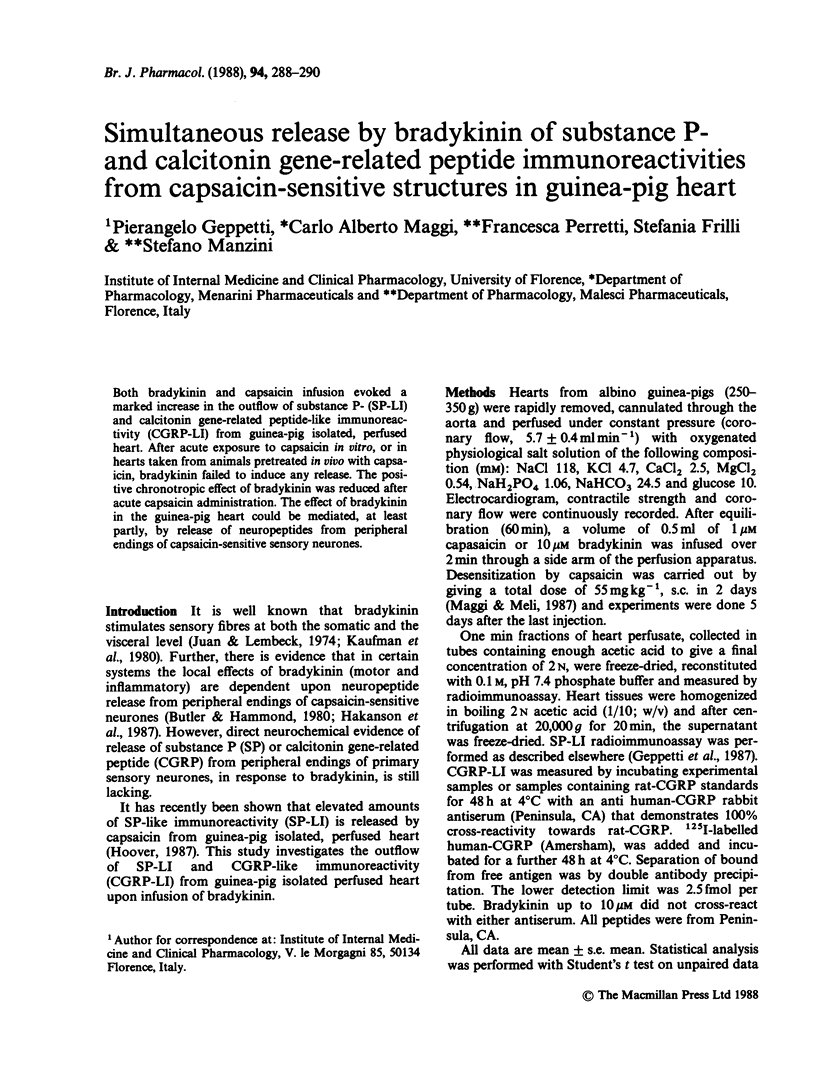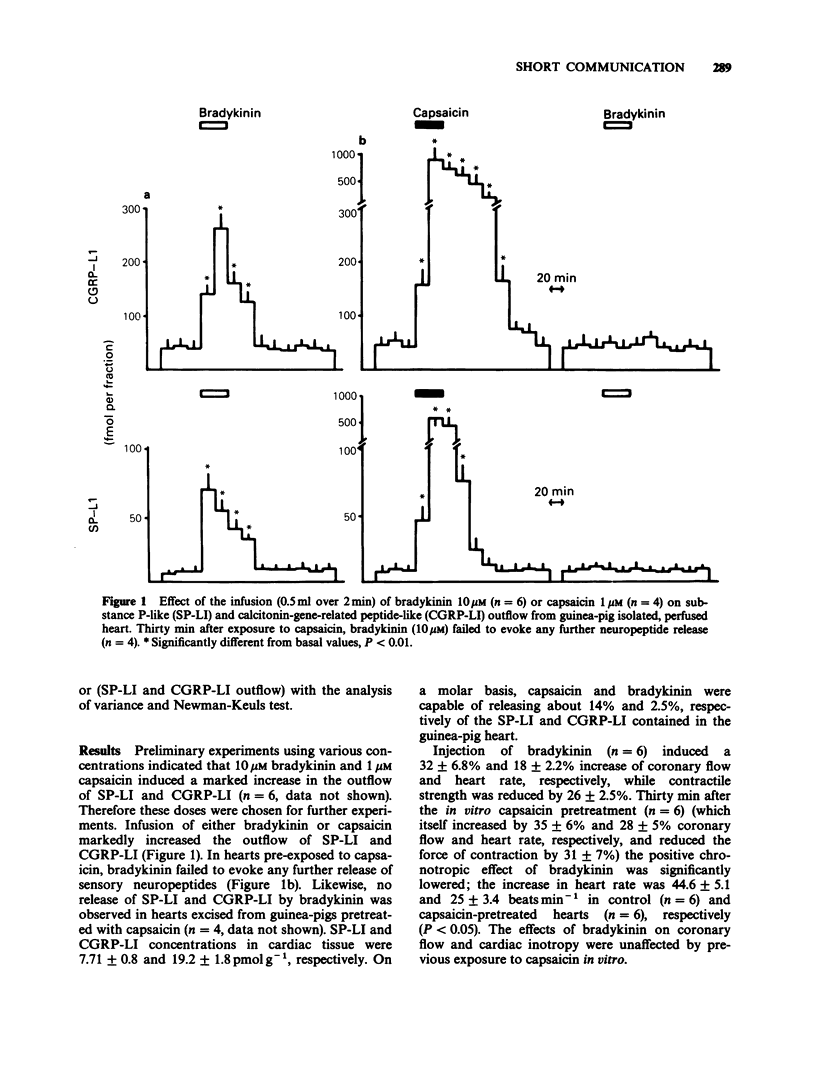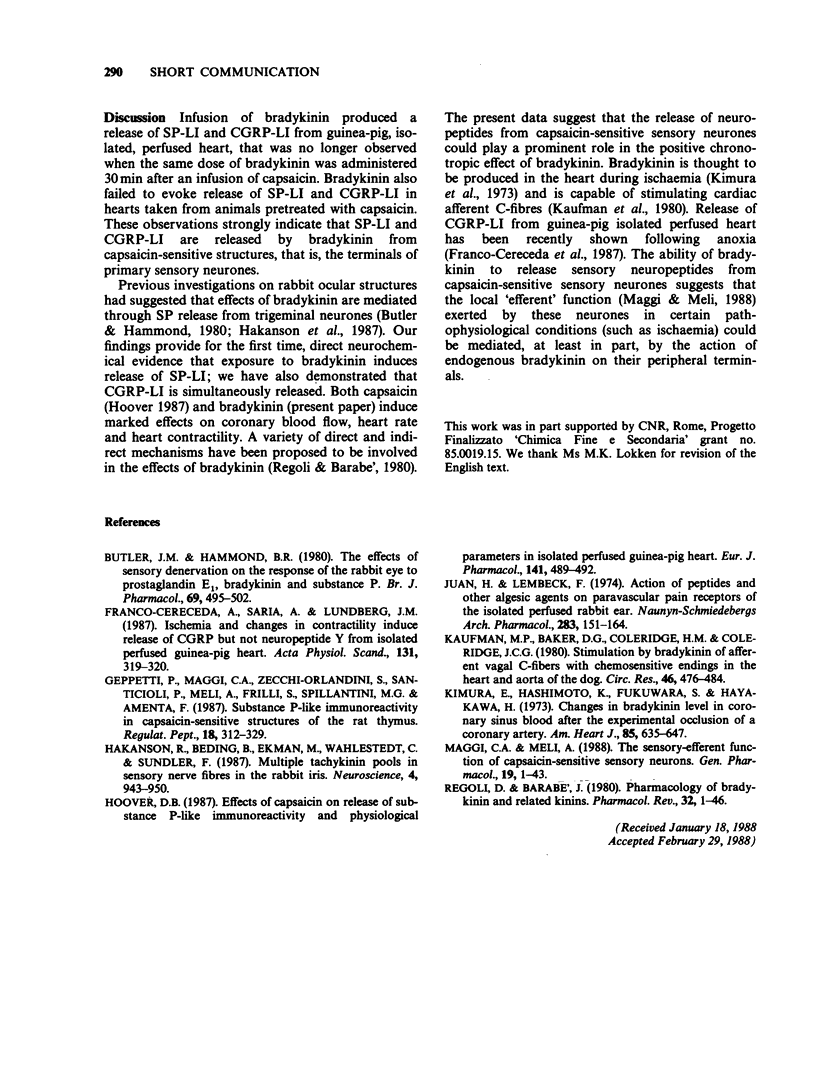Abstract
Both bradykinin and capsaicin infusion evoked a marked increase in the outflow of substance P- (SP-LI) and calcitonin gene-related peptide-like immunoreactivity (CGRP-LI) from guinea-pig isolated, perfused heart. After acute exposure to capsaicin in vitro, or in hearts taken from animals pretreated in vivo with capsaicin, bradykinin failed to induce any release. The positive chronotropic effect of bradykinin was reduced after acute capsaicin administration. The effect of bradykinin in the guinea-pig heart could be mediated, at least partly, by release of neuropeptides from peripheral endings of capsaicin-sensitive sensory neurones.
Full text
PDF


Selected References
These references are in PubMed. This may not be the complete list of references from this article.
- Butler J. M., Hammond B. R. The effects of sensory denervation on the responses of the rabbit eye to prostaglandin E1, bradykinin and substance P. Br J Pharmacol. 1980 Jul;69(3):495–502. doi: 10.1111/j.1476-5381.1980.tb07040.x. [DOI] [PMC free article] [PubMed] [Google Scholar]
- Franco-Cereceda A., Saria A., Lundberg J. M. Ischaemia and changes in contractility induce release of calcitonin gene-related peptide but not neuropeptide Y from the isolated perfused guinea-pig heart. Acta Physiol Scand. 1987 Oct;131(2):319–320. doi: 10.1111/j.1748-1716.1987.tb08244.x. [DOI] [PubMed] [Google Scholar]
- Geppetti P., Maggi C. A., Zecchi-Orlandini S., Santicioli P., Meli A., Frilli S., Spillantini M. G., Amenta F. Substance P-like immunoreactivity in capsaicin-sensitive structures of the rat thymus. Regul Pept. 1987 Sep;18(5-6):321–329. doi: 10.1016/0167-0115(87)90189-3. [DOI] [PubMed] [Google Scholar]
- Hoover D. B. Effects of capsaicin on release of substance P-like immunoreactivity and physiological parameters in isolated perfused guinea-pig heart. Eur J Pharmacol. 1987 Sep 23;141(3):489–492. doi: 10.1016/0014-2999(87)90571-1. [DOI] [PubMed] [Google Scholar]
- Håkanson R., Beding B., Ekman R., Heilig M., Wahlestedt C., Sundler F. Multiple tachykinin pools in sensory nerve fibres in the rabbit iris. Neuroscience. 1987 Jun;21(3):943–950. doi: 10.1016/0306-4522(87)90049-2. [DOI] [PubMed] [Google Scholar]
- Juan H., Lembeck F. Action of peptides and other algesic agents on paravascular pain receptors of the isolated perfused rabbit ear. Naunyn Schmiedebergs Arch Pharmacol. 1974;283(2):151–164. doi: 10.1007/BF00501142. [DOI] [PubMed] [Google Scholar]
- Kaufman M. P., Baker D. G., Coleridge H. M., Coleridge J. C. Stimulation by bradykinin of afferent vagal C-fibers with chemosensitive endings in the heart and aorta of the dog. Circ Res. 1980 Apr;46(4):476–484. doi: 10.1161/01.res.46.4.476. [DOI] [PubMed] [Google Scholar]
- Kimura E., Hashimoto K., Furukawa S., Hayakawa H. Changes in bradykinin level in coronary sinus blood after the experimental occlusion of a coronary artery. Am Heart J. 1973 May;85(5):635–647. doi: 10.1016/0002-8703(73)90169-5. [DOI] [PubMed] [Google Scholar]
- Maggi C. A., Meli A. The sensory-efferent function of capsaicin-sensitive sensory neurons. Gen Pharmacol. 1988;19(1):1–43. doi: 10.1016/0306-3623(88)90002-x. [DOI] [PubMed] [Google Scholar]
- Regoli D., Barabé J. Pharmacology of bradykinin and related kinins. Pharmacol Rev. 1980 Mar;32(1):1–46. [PubMed] [Google Scholar]


